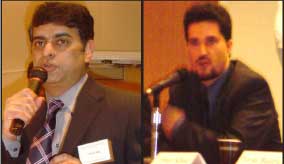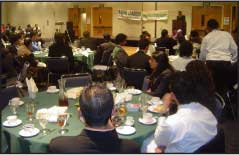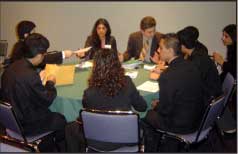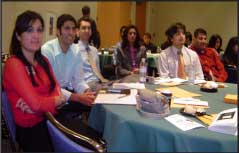A Landmark Youth Conference
in LA
By Aisha Chapra
 L
to R :Faizan Haq and Omar Khan
L
to R :Faizan Haq and Omar Khan |
Rising Leaders and the
National Pakistani Students Association (National PSA) organized
a one-day conference on March 12
in Los Angeles, California. The conference was hosted by the
Pakistani Students Association at University of California,
Los Angeles (PSA-UCLA).
Rising Leaders has become a nationwide representative of the
Pakistani-American youth in a rather short span of time. It
now has chapters in all geographic regions of the United States.
Rising Leaders aims to enhance the political participation
of Pakistani-Americans and to train the youth on how to be
part of the US political system. The National PSA is an umbrella
organization that works to ensure that member PSAs have a
strong and active presence on their college and university
campuses.
The theme of the conference was to prepare young Pakistanis
living in America to face the challenges of the future. The
conference had two panels of distinguished speakers from the
Pakistani-American community.
Sana Muttalib, the Vice President of PSA-UCLA, opened the
conference with a recitation from the Holy Qur’an. The
opening remarks were made by the President of the PSA-UCLA
Asad Qasim, Chair of National PSA, Hyder Syed and Executive
Director of Rising Leaders, Nadia Naviwala.
Special guests included the Deputy Chief of Mission Mohammad
Sadiq, who spoke on “The Impact of Culture on Work”.
He gave valuable insight on how culture influences work-ethics
for both Pakistani and other cultures. The premise of his
speech was that all cultures have negative and positive aspects
but what may be positive for one culture is not necessarily
a positive for others. At the same time, all negatives are
not absolute negatives. A lot of cultural norms and phenomena
exist in the gray area.
One of the most compelling examples he gave in his speech
was the cultural differences between Pakistanis and Chinese
in relation to time. The Chinese, he stated, would tell their
Pakistani friends that they have a just position on Kashmir.
India is an occupier and unjust. Justice will prevail even
if it takes 50 or 100 years. Pakistanis would react with extreme
disbelief and shock. DCM Sadiq explained 100 years for the
Chinese is a relatively short duration of time in their 5000-year
history, whilst for Pakistanis, a century is twice the history
of our nations’ existence.
 Consul
General Jadmani addresses the gathering
Consul
General Jadmani addresses the gathering |
 DCM Sadiq with organizers of the
event
DCM Sadiq with organizers of the
event |
 The audience during the ice-breaker
The audience during the ice-breaker
|
DCM Sadiq continued to
make interesting observations throughout his address, including
how Pakistanis desired to achieve great accomplishments in
a short period of time, “they want to fix the education
system in Pakistan overnight”; “become an Asian
tiger in a year” and “a world-class IT resource
in a few months”. He said great achievements come with
planning ahead — planning for decades and even generations.
It is a much needed prequisite to succeed and to achieve individual
and national goals.
DCM Sadiq said the positive attributes of the Pakistani culture
are embodied in our family structure and our faith. He quoted
from a just concluded study on philanthropy in the Pakistani-American
community. The amazing finding is that Pakistani-Americans
give more of their time and money to philanthropy than any
other minority group in the US. “The spirit of giving
back to our community is part of our cultural and our religious
identity”; however, our contributions are not organized
and visible. If Pakistani Americans organize themselves and
make their presence visible, the community could have a lot
more power.
DCM Sadiq also said that out of all the minorities in the
US, the Pakistani-American community has the largest percentage
of homemakers. He urged homemakers to at least participate
in school boards and to be active in their community. Just
by joining school boards, the Pakistani-American women will
give a powerful voice to the community.
After DCM Sadiq’s address, the conference was led into
an icebreaker by Yaseen Nazir, in which participants were
asked to discuss the future role they saw for Pakistani-Americans
in the US and abroad. A participant from USC remarked that
Pakistani Americans should not blindly follow career trends.
“If we all follow the latest lawyer trend then we will
have many bad lawyers — what each person should realize
is that everyone should pursue his own dreams”. Another
participant observed that “Pakistani Americans are greatly
underrepresented in the field of media and art. People should
realize that creative energy cannot be stopped and people
with creative talents in music and art should be given the
encouragement to pursue what they desire.”
After the icebreaker, the Social Chair of PSA-UCLA, Fawad
Ursani, introduced the panel coordinator, Nadia Naviwala.
The panel, “Politics is not just for Politicians”,
included: Mr. Faizan Haq, Secretary General of the Pakistani-American
Congress; Mr. Omar Khan, Co-CEO of Netpace and Host of TV
show Jaiza on GEO; Mr. Hamid Khan, Executive Director of South
Asian Network; Mr. Faiz Rehman, Executive Director of Pakistani-American
Liaison Center; and Mr. Favad Bajaria, a senior from University
of Texas, Austin and the Director of UT, Austin’s Student
Government Legislative Relations Agency.
 Dinner
Dinner
|
The panelists gave presentations
on why they felt politics is important and the issues that
Pakistani-Americans are facing. Mr. Omar Khan expressed his
concern on the divide between older generation Pakistanis
and second generation Pakistani Americans and the divide within
the youth, between people from Pakistan and Pakistanis who
have grown up in the US.
Favad Bajaria, spoke about the conspiracy theories Pakistani
Americans have in their minds when it comes to participating
in American politics and how they are invalid in most cases.
He also explained how one does not have to be sure of his
political affiliation as very few Americans entirely agree
with either the Democratic or Republican party platforms.
Mr. Faiz Rehman spoke about the importance for the youth to
take a stand, to use their political power and have their
voices heard. Mr. Hamid Khan spoke on the topic of immigration
in the US and how the South Asian community has built upon
movements dating nearly a century ago. Mr. Faizan Haq shared
Pakistani poetry with the audience in his thought-provoking
remarks.
The panel was followed by a Q & A session. A student asked:
What are the ways that Pakistani Americans can bridge the
divide between the older generation and the younger generation?
A consensus amongst the speakers was that people must make
an effort to connect with their Pakistani heritage as well
as today’s Pakistan. Mr. Faizan Haq stated that “he
was not going to be that easy on the older generation”.
He emphasized how parents must teach their children about
Pakistan’s history and literature.
The second panel was coordinated by Yaseen Nazir and was on
the topic of “Business and Politics”. Dr. Raza
Bokhari, CEO of Lakewood Pathology; Mr. Mossadaq Chughtai,
CEO of Zima Inc.; Mr. Bob Din, CEO and President of EnPointe
Technologies; Mr. Sheeraz Hasan, CEO of Tinseltown TV; Dr.
Sana Khan, CEO of True MRI; Mr. Shaukat Sindhu, CEO of Pakwatan.com;
and Mr. Najeeb Ghauri, CEO of Netsol International were the
panelists. Their focus was individual success stories.
Mr. Bob Din said business and politics differed greatly —
business is unforgiving whereas with politics one can afford
to make mistakes. Dr. Raza Bokhari and Dr. Sana Khan both
remarked on how as leaders they have to support and encourage
their employees consistently to make their businesses successful.
Mr. Mossadaq Chughtai and Mr. Shaukat Sindhu described their
business experiences and encouraged the participants to focus
on hardwork. Mr. Najeeb Ghauri spoke about the social responsibility
Pakistani Americans have towards their community.
All the speakers concentrated on the importance of the entrepeneurial
spirit of Pakistani Americans and the ability to face up against
the odds with determination and faith.
Dr. Sana Khan commended the older generation Pakistanis on
their courage to move to the United States and build a life
from scratch. He asked the audience, “How many of you
would be willing to move to, let’s say, Brazil?”
His point highlighted the incredible feat most Pakistanis
have achieved as recent immigrants to the US by becoming one
of the most successful minorities.
The panel was concluded with the remarkable story of Mr. Sheeraz
Hasan, who without any formal training in the entertainment
industry came to LA and started a very successful show, Tinseltown
TV. The show is viewed today by millions of people in South
Asia, US, UK, the Middle East and Africa.
The panel was followed by a forum for the National PSA. Three
PSA members, Sameer Asad from University of Southern California
(USC), Asad Qasim from UCLA, and Ahsan Ahmed from University
of California, Irvine (UCI) gave presentations on recommendations
for the National PSA. The participants acknowledged the need
to enlarge the PSA’s traditional role as a cultural
group into an organization for political activism and a forum
to discuss issues pertinent to Pakistan.
After the presentations the audience was invited to an open-mike
session to raise any issues they felt were relevant to the
National PSA. Amin Khoja, Vice President of PSA at University
of Texas, Austin felt that PSAs should not emphasize the religious
aspect, which sparked a discussion. The PSA representative
from USC, Sameer Asad, stated that because Pakistan is an
Islamic Republic, PSAs cannot disconnect religious identity
from their organization. Mr. Faizan Haq commented that when
he was the president of PSA at his college they had Korean-Pakistani
night, and Polish-Pakistani night which brought people of
different cultures together without compromising on religious
identity. Finally, Chair of National PSA, Hyder Syed concluded
that since Pakistanis are of different faiths, it would be
wrong to exclude those that are not Pakistani-Muslim.
The PSA panel was followed by ‘Meet the Speakers Hour’,
which gave an opportunity to the participants to approach
speakers and ask them specific questions on their presentations
as well as career consulting.
Ambassador Jehangir Karamat was the keynote speaker at the
dinner. PSA-UCLA Treasurer, Subhan Ali, invited Consul General
Noor Muhammad Jadmani to introduce the Ambassador. Consul
General Jadmani thanked the Embassy of Pakistan, Washington
DC for the initiatives it has taken with the youth. He also
thanked the Ambassador for making the trip to LA and meeting
with the community.
Ambassador Karamat began with commending Rising Leaders, the
National PSA and the PSA-UCLA for organizing the conference.
One of his main points was on how Pakistani-Americans must
make the effort to stand up for democracy and fight against
the misperception that Pakistanis do not believe in democracy.
In addition, though individuals have the ability to achieve
a lot, great power lies in organizing the interests of the
community.
The Ambassador also gave advice to the young students in the
audience on how they can become more active participants in
their campus — “Join organizations like Rising
Leaders and PSA, attend workshops and conferences on public
speaking, politics and whatever else that interests you.”
The Ambassador added that in a globalized world Pakistani
Americans must educate and inform themselves on Pakistan-US
relations, in the past, present and future. Pakistan has been
moving forward economically and this helps Pakistan build
itself up to be a stronger country in the world. Finally,
he discussed the importance for young Pakistani Americans
to have knowledge of what Pakistan is, and the role it plays
today in the world, especially through its relationship with
the United States.
The closing remarks were made by Hyder Syed and Asad Qasim.
The conference was followed by a cultural show organized by
PSA-UCLA and included performances by USC, UC Irvine and UCLA.
-------------------------------------------------------------------------------------

